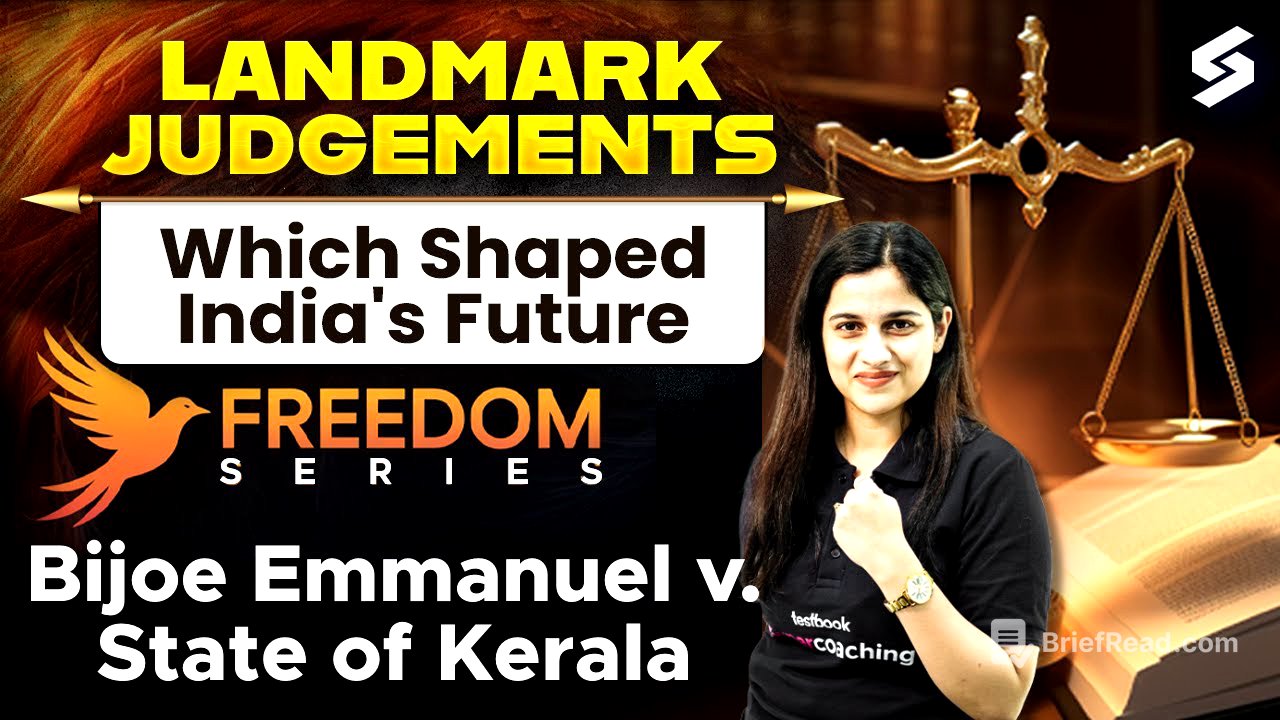TLDR;
This video discusses the landmark case of Vijay Emmanuel, focusing on the Supreme Court's interpretation of Article 19(1)(A) regarding freedom of speech and expression, which includes the right to remain silent. The case involved balancing fundamental rights under Article 19 and Article 25 (freedom of religion). The Supreme Court reversed the expulsion of three children who belonged to the Jehovah Faith for not singing the national anthem, emphasizing constitutional values and tolerance.
- The right to speech and expression includes the right to remain silent.
- There should be a balance between Article 19 and Article 25.
- Administrative instructions cannot override fundamental rights.
Introduction [0:00]
The video introduces the Vijay Emmanuel case, a landmark decision concerning Article 19(1)(A) of the Indian Constitution, which guarantees freedom of speech and expression. The Supreme Court balanced Article 19 with Article 25, which concerns religious freedom. The video promises a detailed discussion of the case's facts, issues, and the Supreme Court's final decision.
Facts of the Case [0:51]
The case involves three children from Kerala, Bijoy, Bindu, and Bindu, who belong to the Jehovah Faith. A core belief within this faith reserves singing solely for God, preventing them from singing the national anthem during school assemblies. While the other students and authorities sang the national anthem, these children stood respectfully but remained silent. The school principal, viewing this as a sign of disrespect and a violation of school guidelines, expelled them.
Legal Issues and High Court Decision [3:24]
The case was initially taken to the Kerala High Court, which ruled in favor of the principal, stating that the children should have sung the national anthem and that their refusal was a violation. The High Court upheld the expulsion.
Supreme Court Issues and Decision [3:49]
Upon reaching the Supreme Court, two main issues were considered: whether the freedom of speech and expression under Article 19(1)(A) includes the right to remain silent, and whether the children's right to freedom of religion under Article 25 was protected. The Supreme Court reversed the expulsion order, stating that there is no state obligation requiring children to sing the national anthem. The court noted that internal school circulars lack legislative backing and cannot override fundamental rights.
Respect and Intentions [5:44]
The Supreme Court addressed whether remaining silent while standing respectfully during the national anthem constituted disrespect. The court concluded that it did not violate the Prevention of Insults to National Honour Act, 1971, as the children did not disturb or prevent others from singing and had no malafide intention, acting instead in accordance with their faith.
Religious Beliefs and Constitutional Rights [7:24]
The court affirmed that the children's religious beliefs were genuine and that forcing them to sing the national anthem would infringe upon their religious freedom under Article 25. The Supreme Court ruled the expulsion unconstitutional, emphasizing the importance of tolerance for constitutional values, a tradition, philosophy, and practice deeply embedded in the Indian Constitution.
Significance of the Case [8:43]
The Vijay Emmanuel case is significant because it affirms that freedom of speech includes the right to remain silent and recognizes religious liberty. The case underscores that administrative instructions cannot override fundamental rights and stands as a cornerstone for the judicial protection of minority rights and individual conscience in India.








